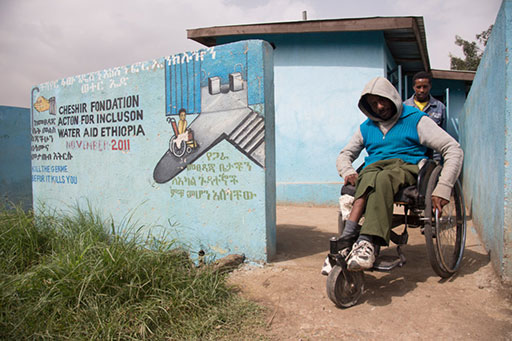1.4 Benefits of inclusive WASH
When WASH facilities are inclusive, everyone in the community benefits especially disabled people of all ages, older men and women, pregnant women, sick or injured people, children, and also the carers of these people. There are social benefits such as better health, improved cleanliness, and increased dignity because people do not have to feel the shame and dishonour of open defecation. Educational improvement is another social benefit. Inclusive WASH in schools results in better attendance and therefore improved educational achievements by the pupils. Case Study 1.1 tells the story of the benefits of inclusive WASH experienced by a pupil at a school in Addis Ababa.
Economic benefits such as increased productivity follow on from the improvements to people’s health and well-being. Healthy people are more productive in their work and do not need to spend money on medicines, which also contributes to higher living standards.
Case Study 1.1 Eniyew Yisma
Eniyew Yisma had polio when he was young which affected his mobility. He uses a wheelchair but can do anything anyone else can do while sitting down. He was a pupil at Bruh Tesfa Primary School in Addis Ababa when new accessible toilet and handwashing facilities were installed (Figure 1.3). Before the new toilets were built, Eniyew had suffered because he could not use the old traditional latrine by himself and had to go home to use the toilet. Most of the time he would skip his food during the day to avoid the problem while at school but sometimes, if he had diarrhoea, he had to ask his class mates to help him use the toilet. He felt bad about himself and his condition but this all changed when the new facilities were built. He could use the toilet on his own, he did not have to ask for help, he could eat his food when he wanted, he felt more dignified and his self-esteem was greatly improved.

Lattu is an old woman who has very poor eyesight. She used to walk to some bushes quite far from her home to find a place for defecation. A family member had to walk with her to guide her but sometimes she would take the risk of going alone. Then a new latrine was built within 15 metres of her home with a path leading to it marked with white stones at the sides. What do you think are the benefits for Lattu?
She can use the toilet whenever she needs to and can go there by herself without help. She has privacy, added dignity and better quality of life. The time spent looking for a place to defecate is saved and the risks of walking on her own such as tripping over and falling, or possible attack by an animal, are no longer a problem. There are also benefits for her family who no longer have to accompany her.
1.3.4 Available resources
